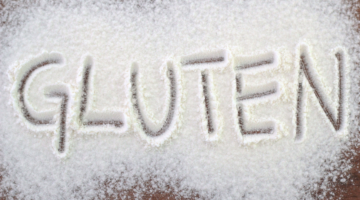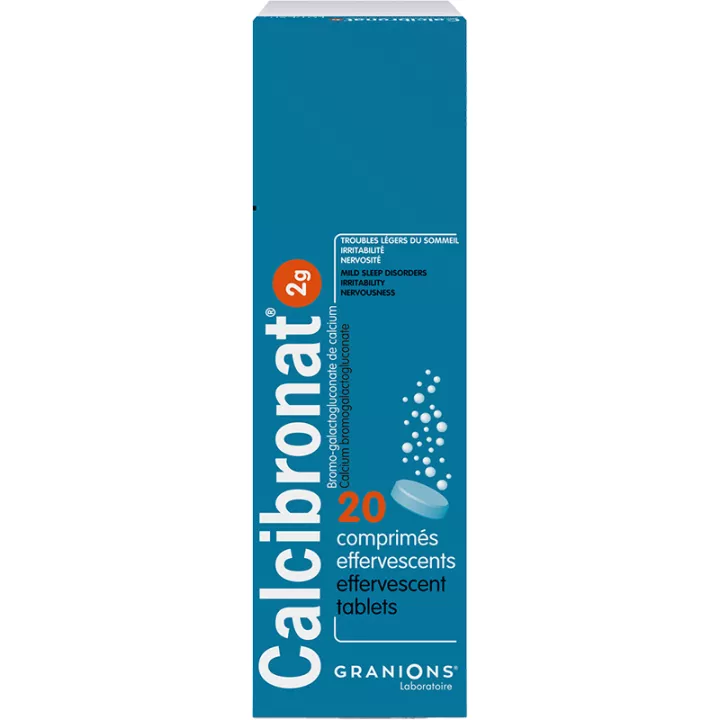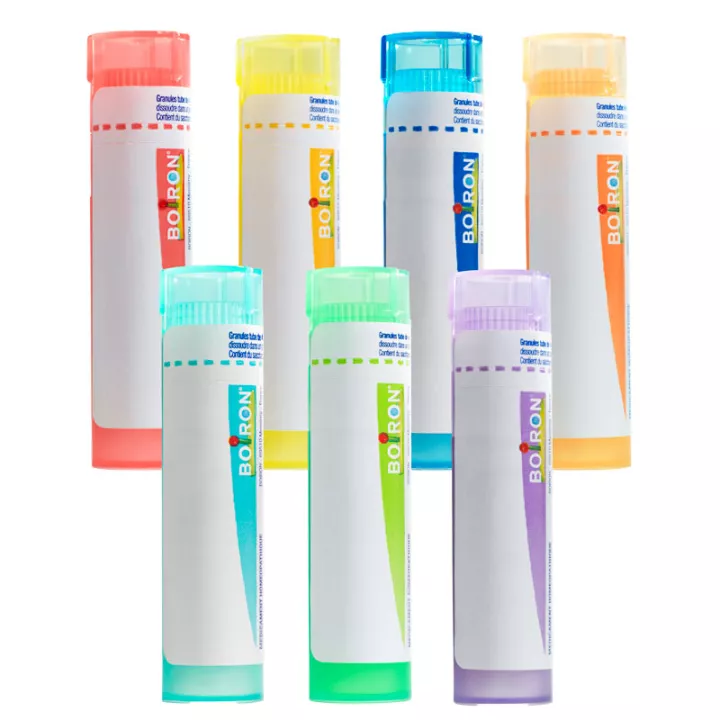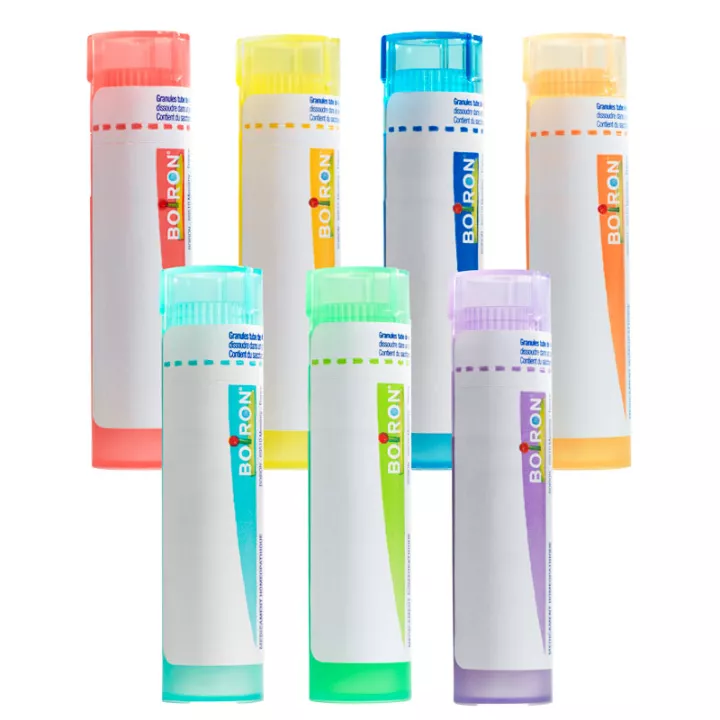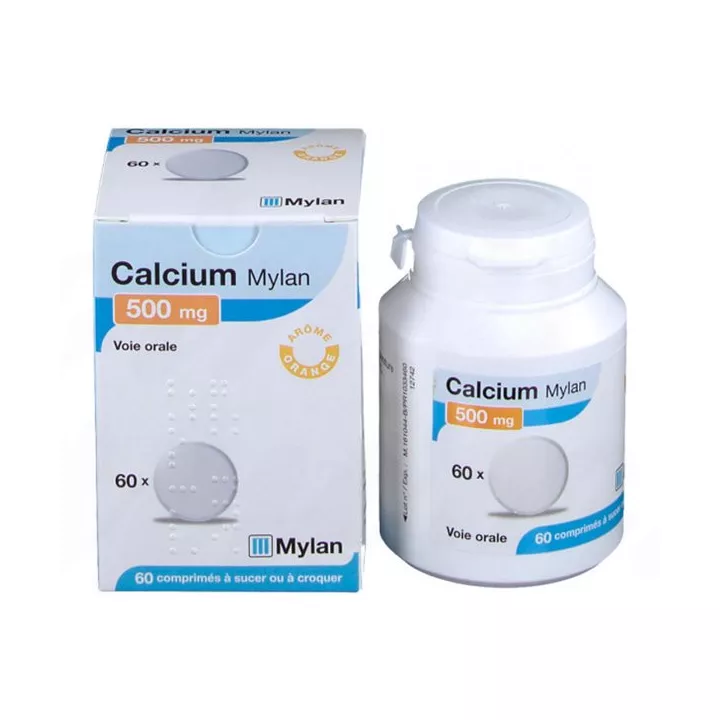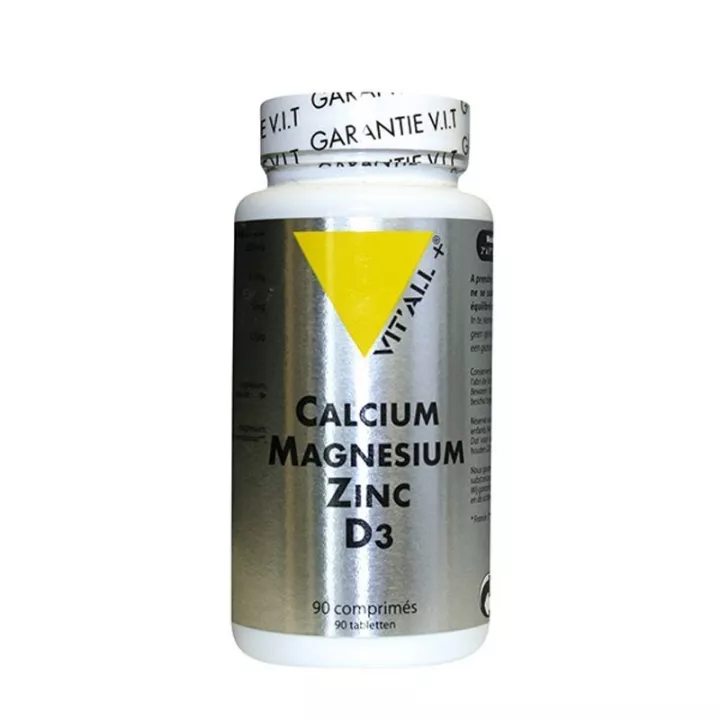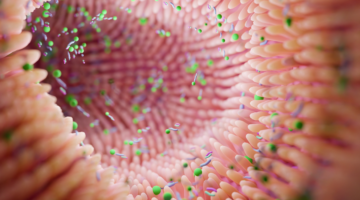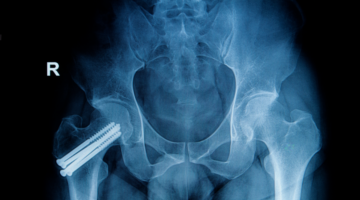NOTICE
ANSM - Last updated: 17/08/2012
Name of the medicinal product
CALCIBRONATE 2 g, effervescent tablet
Calcium bromo-galactogluconate
framed
Read this leaflet carefully before you start taking this medicine. It contains important information for your treatment.
If you have any further questions, ask your doctor or pharmacist.
· Keep this leaflet, you may need to read it again.
· If you need more information and advice, ask your pharmacist.
· If symptoms worsen or persist, consult your doctor.
· If you notice any side effects not listed in this leaflet, or if you experience any of the effects listed as serious, please tell your doctor or pharmacist.
Review summary
In this notice :
1. WHAT IS CALCIBRONATE 2 g, effervescent tablet AND WHAT IT IS USED FOR?
2. BEFORE YOU TAKE CALCIBRONATE 2 g, effervescent tablet?
3. HOW TO TAKE CALCIBRONATE 2 g, effervescent tablet?
4. WHAT ARE POSSIBLE SIDE EFFECTS?
5. HOW TO STORE CALCIBRONATE 2 g, effervescent tablet?
6. ADDITIONAL INFORMATION
1. WHAT IS CALCIBRONATE 2 g, effervescent tablet AND WHAT IT IS USED FOR?
Pharmacotherapeutic group
HYPNOTIC AND SEDATIVE
(N: Central Nervous System)
Therapeutic indications
This drug is recommended in mild sleep disturbances, irritability, nervousness.
2. BEFORE YOU TAKE CALCIBRONATE 2 g, effervescent tablet?
List of information needed before taking the medication
If your doctor has told you about an intolerance to some sugars, contact your doctor before taking this medicine.
Cons-indications
Never take CALCIBRONAT 2 g, effervescent tablet in the following cases:
· Juvenile acne.
· Child under 30 months.
· Elderly undernutrition and / or dehydrated.
· Hypercalcemia, (excessive amount of calcium in the blood).
· Lithium calcium (calculation of calcium).
· Hypercalciuria (excessive amount of calcium in the urine).
· Calcifications (deposits of calcium) in the kidneys.
· Chronic glomerular nephropathy (kidney disease).
· Due to the presence of sucrose, this drug should not be used in patients with fructose intolerance, glucose-malabsorption and gaschrose or sucrase-isomaltase deficiency syndrome.
This medicine should not be used during pregnancy unless your doctor tells you otherwise.
IN CASE OF DOUBT, IT IS ESSENTIAL TO ASK FOR THE OPINION OF YOUR DOCTOR OR YOUR PHARMACIST.
Precautions for use; special warnings
Take special care with CALCIBRONAT 2 g, effervescent tablet:
Special warnings
If you have neuropsychic disorders ( see What are the possible side effects? ), Redness or itching of the skin, stop treatment and see your doctor.
This medicine contains sucrose. Its use is not recommended in patients with intolerance to sucrose (rare hereditary disease).
Precautions for use
· Absorption of alcohol is strongly discouraged during treatment.
· This medicine contains sodium. This medicine contains 241 mg sodium per effervescent tablet. To be taken into account in patients controlling their sodium dietary intake.
· This medicine contains 2.86 g of sucrose per effervescent tablet to be taken into account in the daily diet in the case of a low-sugar diet or diabetes.
· Interference is possible with the determination of chlorides in the blood.
IN CASE OF DOUBT DO NOT HESITATE TO REQUEST THE NOTICE OF YOUR DOCTOR OR PHARMACIST.
Interaction with other medicines
Taking or using other medicines
If you are taking or have recently taken any other medicines, including medicines obtained without a prescription, talk to your doctor or pharmacist.
Interactions with food and beverages
Not applicable.
Interactions with Herbal Medicines or Alternative Therapies
Not applicable.
Use during pregnancy and lactation
Pregnancy and breast feeding
The use of this medication is not recommended unless your doctor tells you otherwise during pregnancy.
If you discover that you are pregnant during treatment, consult your doctor promptly: he alone will be able to adapt the treatment to your condition.
Ask your doctor or pharmacist for advice before taking any medicine.
Sport
Not applicable.
Effects on ability to drive or use machines
Driving and using machines
Driving or using machines is not recommended because of the risk of drowsiness associated with the use of this medication.
List of excipients with known effect
List of excipients with a known effect: sodium, sucrose.
3. HOW TO TAKE CALCIBRONATE 2 g, effervescent tablet?
Instructions for proper use
Not applicable.
Dosage, Mode and / or route (s) of administration, Frequency of administration and Duration of treatment
Dosage
Reserved for adults and children over 30 kg.
Adult: 1 to 2 effervescent tablets per day.
Child over 30 kg: 1 effervescent tablet per day.
Do not exceed the daily dose of:
· two effervescent tablets in adults,
· an effervescent tablet in children over 30 kg.
IN ALL CASES, COMPLY STRICTLY TO THE PRESCRIPTION OF THE PHYSICIAN.
Administration mode
Oral use.
Dissolve the tablet in half a glass of water.
Duration of the treatment
Do not exceed 3 weeks of treatment.
Symptoms and Instructions for Overdose
If you take more CALCIBRONAT 2 g, effervescent tablet than you should:
Notify an emergency doctor.
Instructions for omission of one or more doses
If you forget to take CALCIBRONAT 2 g, effervescent tablet:
Take your medicine at the usual time. Do not double the dose.
Risk of withdrawal syndrome
Not applicable.
4. WHAT ARE POSSIBLE SIDE EFFECTS?
Description of adverse reactions
Like all medicines, CALCIBRONAT 2 g, effervescent tablet is likely to have undesirable effects, although not everyone is subject to it:
· Diurnal somnolence, irritability, disorientation, confusion, hallucinations; these effects are observed in particular in the elderly and at high dosages.
· Loss of appetite, constipation.
· Very rarely: skin involvement (redness, itching),
If you notice any side effects not listed in this leaflet, or if any of the side effects gets serious, contact your doctor or pharmacist.
5. HOW TO STORE CALCIBRONATE 2 g, effervescent tablet?
Keep out of the reach and sight of children.
Expiration date
Do not use CALCIBRONAT 2 g effervescent tablet after the expiry date which is stated on the carton.
Storage conditions
No special storage conditions.
If necessary, warnings against visible signs of deterioration
Medicines should not be disposed of via wastewater or household waste. Ask your pharmacist what to do with unused medications. These measures will help protect the environment.
6. ADDITIONAL INFORMATION
Full list of active substances and excipients
What does CALCIBRONAT 2 g contain, effervescent tablet?
The active substance is:
Calcium bromo-galactogluconate (1) .......................................... .................................................. ... 2,000 g
For an effervescent tablet.
(1) Corresponding to bromine at 301 mg or 3.77 mmol and calcium at 150.7 mg or 3.77 mmol.
The other components are:
Sucrose, sodium bicarbonate, anhydrous citric acid, polyethylene glycol 4000.
Pharmaceutical form and content
What is CALCIBRONAT 2 g, effervescent tablet and contents of the pack?
This medication is in the form of an effervescent tablet. Box of 20 or 60.
Name and address of the marketing authorization holder and the holder of the manufacturing authorization responsible for the release of the lots, if different
Holder
SPC
2720, CHEMIN DE SAINT BERNARD
06220 VALLAURIS
LA FRANCE
exploiting
LABORATORY OF GRANIONS
THE MERCATOR
7, RUE DE L'INDUSTRIE
98000 MONACO
Maker
FAMAR France
1, avenue du Champ de Mars
45072 ORLEANS
LA FRANCE
or
LABORATORY OF GRANIONS
The Mercator
7, rue de l'Industrie
98000 MONACO
or
FAMAR ORLEANS
5, avenue de Concyr
45071 ORLEANS CEDEX 2
Names of the medicinal product in the Member States of the European Economic Area
Not applicable.
Date of approval of the notice
The last date on which this leaflet was approved is {date}.
AMM under exceptional circumstances
Not applicable.
Internet Information
Detailed information on this medicine is available on the Afssaps website (France).
Information for health professionals only
Not applicable.
Other
Not applicable.
